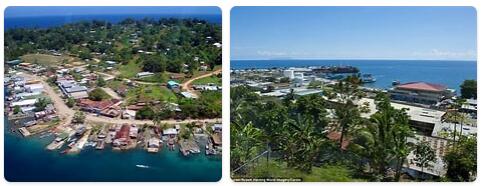In 1998, the Solomon Islands was an archipelago nation located in the western Pacific Ocean with a population of around 500,000 people. The official languages were English and Melanesian Pidgin, and the currency was the Solomon Islands dollar. The government was a parliamentary democracy headed by Prime Minister Bartholomew Ulufa’alu, who had been in office since 1997. The economy of the Solomon Islands in 1998 relied heavily on subsistence agriculture and fishing, with its main exports being copra, palm oil, and timber. Tourism also played an important role; the Solomon Islands had many natural attractions such as beaches, coral reefs, and rainforests which attracted visitors from all over the world. Education was highly valued in the Solomon Islands; literacy rates were higher than average for Pacific Island countries at around 75%. Despite economic difficulties due to its small size and limited resources, the Solomon Islands had managed to maintain its unique culture and traditions which provided hope for a brighter future. See dentistrymyth for Solomon Islands in the year of 2015.
Yearbook 1998
Solomon Islands. At the beginning of the year, Prime Minister Bartholomew Ulufa’alu rejected foreign accusations of having received compensation from Papua New Guinea for opposing the Bougainville island’s struggle for independence. The aid was, according to Countryaah, the capital of Solomon Islands is Honiara. Compensation for taking care of refugees from the Bougainville war.
In July, Ulufa’alu dismissed his finance minister and took care of his duties until further notice. At the same time, two opposition politicians were seated in the government, led by the Solomon Islands Liberal Party (SILP). When the Minister of Domestic Business Development was dismissed in August, six MPs protested from the government side to the opposition. Thus, the opposition claimed that it had the support of 25 of the 49 members of Parliament, but no immediate distrust of the government came to fruition.
- Abbreviationfinder: What does SLB stand for in geography? Here, this 3 letter acronym refers to the country of Solomon Islands.

History. – The St. Islands, formerly a British protectorate, became an independent state within the Commonwealth on 7 July 1978. The first general political elections (August 1980), saw the success of numerous independent candidates and the election of Prime Minister of Fr Kenilorea, already invested with the post in the aftermath of independence. Just a year later the Parliament voted no confidence in Kenilorea and gave the job to S. Mamaloni, leader of the People Alliance Party (PAP), born in 1979 from the merger of the Rural Alliance Party and the People’s Progressive Party, founded in 1973 by Mamaloni himself. In the three years of his government, Mamaloni, in favor of political and administrative decentralization, gave greater powers to the districts through the establishment of five provincial ministries. After the October 1984 elections, a victorious coalition of smaller parties and independent candidates re-elected Kenilorea as prime minister. The five ministries established by Mamaloni were abolished and Kenilorea pledged to strengthen the central governing bodies. In January 1989, shortly before the new elections, the PAP declared its intention to support the proposal, advanced by a constitutional commission chaired by Mamaloni, in favor of the establishment of a federal republic. In February 1989, leaders of the Solomon Islands Liberal Party (SILP), led to the formation of the first government composed of members of a single party (with the exception of an independent). Having abandoned the leadership of his party in October 1990, Mamaloni, in an attempt to avoid the distrust of Parliament and the country, which was experiencing growing economic difficulties, undertook to form a new government coalition, replacing some ministers with members of the opposition and recalling Kenilorea himself to foreigners. The regime of ” national unity ” that was established thus appeared to be based more on the personality of its members than on the democratic contribution of the parties. In May 1993, despite the success of the new political group led by Mamaloni, the Group for National Unity and Reconciliation (GNUR), which won 21 of the 47 seats, the coalition of opposition parties in Parliament elected independent F. Billy Hilly as prime minister.
In the first months of 1993, diplomatic relations improved with Papua New Guinea, responsible for numerous raids on the territory of the S Islands; relations between the two countries, already cracked by the question of maritime borders, had suffered a sharp deterioration in the late 1980s due to the conflict that broke out between the separatists on the island of Bougainville and the government of Papua. The latter has repeatedly accused the S. Islands of subsidizing the rebels of the Bougainville Revolutionary Army (BRA).